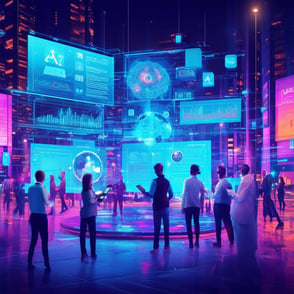Introduction to AI in Healthcare: Understanding Its Impact and Potential
Defining AI and Its Role in Healthcare: Foundations of Artificial Intelligence
Artificial intelligence (AI) is revolutionizing the health care industry, offering unprecedented tools for enhancing patient care and health outcomes. By integrating AI into health care systems, medical professionals can leverage data-driven insights to make informed decisions, improve diagnostic accuracy, and personalize patient treatment plans. AI's role extends from analyzing electronic health records for better patient management to deploying predictive models that forecast patient risks and outcomes.
The Evolution of AI in Healthcare: From Concept to Application
The journey of AI in health care has transitioned from theoretical frameworks to practical applications, impacting various facets of the healthcare system. AI applications in health care range from machine learning algorithms that interpret medical images to AI systems that provide real-time insights during surgical procedures. These advancements underscore AI's potential to transform healthcare delivery, making it more efficient and responsive to patient needs.
The Spectrum of AI Technologies: Understanding Generative AI and Machine Learning in Health
Exploring the spectrum of AI technologies reveals a variety of tools, including generative AI and machine learning, that enhance healthcare's capabilities. Generative AI, for instance, can create realistic simulations and models for training medical professionals, while machine learning algorithms can learn from vast datasets to improve health care outcomes. These technologies underscore the vast potential of AI to innovate and enhance health care services.
Exploring the Core Aspects of AI: Deciphering Artificial Intelligence and Generative AI in Health Care
The Intersection of AI and Healthcare Systems: Enhancing Care with Use Intelligence
AI's integration into healthcare systems signifies a paradigm shift, offering tools that enhance the intelligence of health care operations. From optimizing hospital workflow to improving patient triage, AI systems are becoming an integral part of health care infrastructure, driving efficiencies and improving care quality.
Generative AI in Action: Real-World Applications in the Healthcare Sector
Generative AI is making strides in the healthcare sector by providing innovative solutions, such as synthesizing patient data to generate realistic health scenarios for training or research. These applications demonstrate the practical benefits of AI, showcasing its ability to support healthcare professionals and improve patient outcomes.
AI has the potential in Healthcare Innovation: Potential of AI to Healthcare and Possibilities
AI acts as a catalyst for innovation in healthcare, pushing the boundaries of what's possible in medical treatment and care management. By harnessing AI's capabilities, health care organizations can unlock new possibilities for disease prevention, early detection, and personalized medicine, ultimately enhancing the healthcare experience for patients and providers alike.
The Strategic Integration of AI in Healthcare: Benefits of AI in Healthcare
AI in Clinical Environments: Transforming Patient Care and Healthcare Data Analysis
In clinical environments, AI is transforming patient care through advanced data analysis and decision support. AI algorithms can analyze complex healthcare data to identify trends, predict patient outcomes, and provide actionable insights, enhancing the quality and efficiency of patient care.
Use Gen AI in Healthcare Decision-Making: AI's Role in Healthcare Organizations
AI's role in healthcare decision-making is increasingly crucial, providing health care organizations with tools to analyze data, optimize operations, and make evidence-based decisions. By leveraging AI, healthcare providers can enhance their decision-making processes, leading to better patient outcomes and organizational efficiency.
The Synergy between AI and Healthcare Professionals: Collaborative Care Models
The collaboration between AI and healthcare professionals is fostering new care models that leverage the strengths of both human expertise and AI capabilities. This synergy enhances the healthcare delivery process, ensuring that patients receive the most informed and effective care possible.
Analyzing the Benefits and Promise of AI: The Transformative Power of AI to Improve Healthcare Outcomes
Measuring the Impact of AI: Improved Outcomes and Efficiency in Healthcare
The impact of AI in health care is measurable, with significant improvements in outcomes and efficiency. AI-driven tools and systems enable healthcare providers to deliver more accurate diagnoses, tailored treatments, and proactive health management, contributing to enhanced patient outcomes and health care system performance.
AI's Contribution to Personalized Medicine: Customizing Best Care with Artificial Intelligence
AI's contribution to personalized medicine is profound, enabling the customization of healthcare to individual patient needs. Through data analysis and predictive modeling, AI helps healthcare providers develop personalized treatment plans that improve patient outcomes and enhance the quality of care.
The Future of AI in Healthcare: Predictions and Emerging Artificial Intelligence in Healthcare Trends
The future of AI in health care is bright, with ongoing advancements and emerging trends shaping the sector. As AI technologies evolve, their applications in healthcare will expand, offering new opportunities to improve health care delivery, patient outcomes, and the overall health system.
Conclusion: Embracing the Future of artificial intelligence in healthcare - The Road Ahead for Artificial Intelligence in Care
In conclusion, AI in health care represents a transformative force, offering the promise of enhanced patient care, improved health outcomes, and more efficient healthcare systems. As we embrace the future of AI in healthcare, it is crucial to continue exploring its potential, addressing challenges, and leveraging its benefits to shape a healthier future for all.
FAQ
How is AI improving patient outcomes in healthcare?
AI enhances patient outcomes by equipping healthcare professionals with sophisticated tools for precise diagnosis, personalized care, and predictive analytics. This application of AI in healthcare, particularly through machine learning and generative AI, offers more effective, tailored patient treatments, utilizing vast data insights for improved health management and patient outcomes. These advancements underscore the benefits of AI in healthcare, demonstrating significant impacts on medical record accuracy and patient care personalization.
What are some key applications of AI in healthcare?
Key applications of AI in healthcare span various functions, including medical image analysis, patient data management, and predictive analytics, enhancing personalized medicine and healthcare delivery efficiency. Notably, the use of AI and generative artificial intelligence in healthcare is pivotal, advancing fields from diagnostic procedures to operational strategies within many healthcare organizations. These applications exemplify how AI can support healthcare systems, showcasing the technology's potential to transform healthcare practices and administrative processes.
Can AI replace human healthcare providers?
AI is designed to augment, not replace, human healthcare providers. It offers valuable insights and aids, like chatbots for patient interaction or AI systems that assist with clinical decisions, enhancing healthcare delivery without supplanting the essential human touch. The collaboration between AI tools and healthcare professionals exemplifies the integration of AI into clinical practice, aiming to complement rather than substitute the roles of healthcare providers.
What are the challenges of integrating AI into healthcare systems?
Integrating AI into healthcare systems presents challenges, including data privacy issues, the necessity for precise and unbiased algorithms, and the integration with current healthcare infrastructures. Training healthcare professionals to adeptly use AI and addressing the greatest challenge to AI—ensuring ethical and effective implementation—are critical for maximizing its potential. The conversation around AI adoption in healthcare also extends to addressing fears that AI may replace some healthcare provider roles, emphasizing the need for balanced and responsible AI deployment.
What is the future potential of AI in healthcare?
The future potential of AI in healthcare is expansive, promising to enhance all healthcare delivery aspects, from diagnostics to treatment and healthcare system efficiency. As AI technologies evolve, such as deep learning AI and generative AI, their applications in healthcare are set to broaden, potentially revolutionizing healthcare costs management, patient engagement, and overall health systems. The prospect of AI in healthcare suggests a shift towards more predictive, personalized, and efficient healthcare solutions, leveraging AI's capabilities to meet the complex needs of the healthcare industry and its patients.
How does AI in the form of conversational chatbots and Gen AI contribute to the healthcare industry?
Conversational AI, particularly in the form of chatbots, offers a significant advancement in the healthcare industry by providing immediate, accessible communication channels for patients. These AI-driven chatbots can deliver health information, schedule appointments, and even guide patients through symptom checking processes. On the other hand, Gen AI can analyze vast datasets to uncover insights that inform clinical decision-making and patient care strategies. The use of Gen AI in healthcare not only enhances the efficiency of medical services but also supports personalized care plans, demonstrating how AI can help healthcare systems adapt to individual patient needs. Furthermore, the adoption of AI technologies like these in clinical practice signifies a shift towards more interactive, responsive healthcare environments where patient engagement and satisfaction are prioritized.
What are the potential impacts of AI on healthcare providers and the delivery of care?
AI has the potential to significantly impact healthcare providers and the delivery of care, particularly through the adoption and application of AI systems within healthcare environments. AI can help clinicians by offering diagnostic support, predictive analytics, and personalized treatment recommendations, thereby enhancing the accuracy and effectiveness of care. However, the integration of AI also presents challenges; the greatest challenge to AI is ensuring these systems complement rather than replace human healthcare providers. While AI can automate certain tasks, it is crucial that this technology is used to augment the roles of healthcare providers, not diminish their importance. The deployment of AI in healthcare must be carefully managed to ensure it supports healthcare professionals, enhances patient care, and contributes positively to health systems. As AI technologies advance, their thoughtful application in healthcare can lead to improved health outcomes, more efficient care delivery, and innovations that benefit the entire healthcare sector.
As we embrace the breakthroughs in AI and its burgeoning role across various systems in healthcare, we must acknowledge the transformative power of this technology. From gen AI that enhances learning in healthcare to AI systems that are beginning to redefine clinical practice, the journey of applying AI in healthcare is marked by both promise and challenges. Ultimately, by integrating and leveraging AI for health, we enable a future where healthcare providers are supported by AI, ensuring better outcomes for patients and advancing the healthcare industry.
Tags:
AIMar 1, 2024 10:19:48 AM






Comments